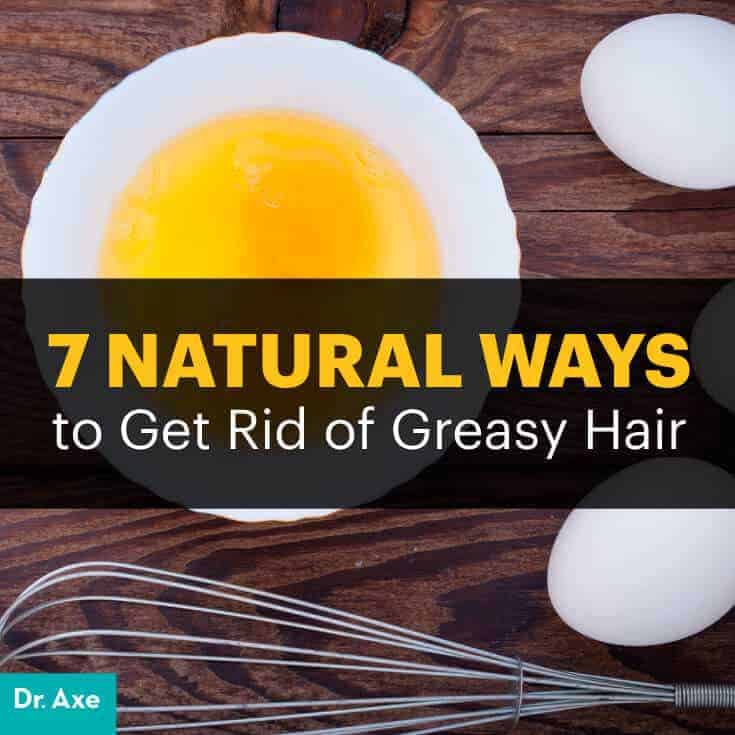
Greasy hair is frustrating, especially if you know your hair is clean! Greasy/oily hair looks dirty and dingy, and it’s usually more evident in blonde and lighter hair colors than darker hair colors. But does the greaseball look only affect those of us who didn’t take that post-workout shower? Hardly.
While having unclean hair can definitely cause it, greasy hair is typically the result of excess secretion of sebum by the sebaceous glands of the scalp. While some secretion is normal and should happen for a healthy scalp and hair, too much secretion creates that oily look and can even cause an itchy scalp, dandruff and scalp acne, which is a skin disorder known as seborrheic dermatitis. In addition, oily hair can cause thinning and disrupt its natural luster and shine. (1)
So exactly how to get rid of greasy hair? Let’s look at some brilliant natural remedies you can start using soon.
7 Natural Remedies to Get Rid of Oily Hair
1. Eat a Balanced Diet of Healthy Fats and Carbs
Studies suggests that the foods we consume can affect our sebaceous glands and how much is excreted. More dietary fat or carbohydrates can actually increase the production of sebum from the sebaceous glands. On the other side, caloric restriction has been shown to dramatically decrease the sebum secretion rate — and it’s the sebum component that can greatly affect acne. (2)
So, is it as simple as eating less fat and restricting calories from carbs? Probably not, but choosing the right fats (healthy fats like ghee and coconut oil) and carbs is likely to help create a more positive balance in the oil-producing sebaceous glands. Studies have shown that increasing the intake of omega-3 fatty acids through a diet rich in fish and seafood results in a lower rates of acne. Since the Western diet typically has way more omega-6s than omega-3 fatty acids, balancing that for a healthier 2:1 ratio (omega 6 to omega 3) can help.
2. Shampoo More Frequently
Usually, I encourage less washing for a healthier approach to hair, but if you have oily hair, you probably need to wash a bit more. When you shampoo, it collects the oils and dirt and gives you the opportunity to rinse it out of your hair. Washing daily or every other day may do the trick. (3)
Also, using the right shampoo, such as my shampoo for oily hair recipe, can make a big difference. If dandruff has come into the picture, check out my DIY anti-dandruff shampoo that may help.
3. Apple Cider Vinegar
Fungus is naturally found on the scalp and is called malassezia. But even though it’s a naturally occurring fungus, when it grows out of control, it can cause your scalp to get oily and irritated. This can can cause dandruff, too.
Fortunately, apple cider vinegar has the ability to kill fungus and bacteria, it makes a great home remedy for oily hair. One of the most popular natural remedies out there, you don’t need much ACV, as too much can be harsh on the scalp and hair.
Simply dilute two to three tablespoons in a cup of water, and then put it on your hair. A spray bottle may make it easier, just make sure you get it into the roots and scalp. Rinse after two to three minutes. Apply two or three times a week. Here is a great apple cider vinegar hair rinse that you can try!

4. Make a Dry Shampoo for a Quick Fix
A DIY dry shampoo made out of arrowroot powder and essential oils can prevent the greasiness from getting to the hair. This is a great option especially if you are in a hurry. While some choose baby powder, make sure it’s asbestos-free, as some studies show that it may cause cancer — instead, skip the worry and go with arrowroot powder, which comes from the tubers of the plant without the use of harsh chemicals or high heat. (4) (5)
READ RELATED: Dermatologists Swear by This Drugstore Nail Strengthener for Stronger, Healthier Nails
By sprinkling a little directly onto the scalp and brushing through your hair, you can make the hair appear less greasy. Washing when you get a chance is best, but for those moments when you just don’t have time, this can be a great solution.
5. Witch Hazel as a Scalp Astringent
While you may not have thought about an astringent for the hair, it may be just the ingredient you need to do the trick. Astringents cause the contraction of body tissues, typically of the skin — in the case of how to get rid of greasy hair, it can help close up the pores a bit so that less oil is released. In fact, witch hazel is often recommended for people with acne if they have oily skin. It also helps eliminate fungus. (6) (7)
Now, you need those oils so you do not want to do this too much, but a few times a week should be fine. When applying an astringent directly to the scalp before washing, it can significantly diminish that greasiness from the scalp and hair. Witch hazel acts to eliminate oil and by dabbing a few drops of witch hazel mixed with water onto the hair before shampooing, it may give it the extra boost it needs.
6. Use an Egg Yolk Hair Mask
You have probably heard of using egg as a mask on the face to help prevent acne, but what about the health benefits of eggs for the hair? Egg yolks have a high sulfur content, which can help relieve dandruff and greasy hair symptoms. Also, egg yolks contain lecithin and protein, which can help strengthen your hair while providing it with a softer, shinier appearance.
You can simply beat the egg yolks by themselves or mix them with honey, tea tree oil or olive oil, apply to dry hair, leaving on for about 5 to 20 minutes. Then wash your hair thoroughly and rinse well. (8)
7. Tea Tree Oil for Oily Hair
Some essential oils can provide the desired results. Tea tree oil is known for helping to control acne, but it also has the capability of controlling sebum production. When too much oil is produced, it can combine with dead skin cells, eventually blocking your pores. This can cause a range of skin conditions, such as acne and even cystic acne on the scalp. Additionally, tea tree oil is antimicrobial, reducing bacteria, which may help minimize or eliminate fungus. (9) (10)
Some other essential oils known to be helpful are lemon, bergamot and tea eucalyptus. By adding a few drops to your conditioner, or better yet, using my homemade conditioner, your hair can become oil-free and shiny!
What Are the Sebaceous Glands?
Every pore on your skin has a sebaceous gland to include the pores on your scalp. These glands, often referred to as oil glands, are responsible for maintaining proper hydration levels through the sebum or the oil that they produce. It’s the sebum the gives your luscious locks a healthy shine. So we need those sebaceous glands, but when producing oil in excess, it can make your hair greasy.
The sebaceous glands are pretty important, beginning their work immediately at birth. Ever notice how infants sometimes appear to have greasy hair? It may be because there is a strong increase in sebum excretion just a few hours after birth and during the first week. A new rise in sebum excretion takes place at about age 9 and continues up to age 17.
The number of sebaceous glands do not change much throughout life, but their size tends to increase as we get older. The sebaceous glands can be affected by various hormones in the body and human sebum contains cholesterol, cholesteryl esters, squalene, fatty acids, diglycerides and triglycerides, and wax esters. You may also hear the word seborrhea, which is a more technical term for oily skin. Parts of the body that are most affected contain a higher density of sebaceous glands, and are usually found in such areas as the face, ears, scalp and upper part of the trunk of the body. Seborrhea may develop into seborrheic dermatitis, which is a skin disorder consisting of red, scaly patches that may be found all over the body. (11) (12)
Final Thoughts
Oily hair can usually be remedied with a few of these suggestions; however, if you do not see positive results, you may want to see your doctor or a dermatologist. Because the structure of our sebaceous glands vary from person to person, try different options to see what works for you. Start with smaller amounts of some of the suggestions at first. Make sure to avoid getting any of the ingredients in your eyes and if you notice an allergic reaction, stop use right away.
Source: Dr. Axe






